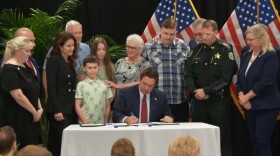-
One law improves access to care in rural and underserved schools. The other, known as the Tristin Murphy Act, will streamline the process of getting nonviolent offenders needed treatment.
-
An estimated 4 million Americans will lose insurance over the next decade if Congress doesn’t extend enhanced subsidies for ACA marketplace coverage. Florida and Texas would see the biggest losses.
-
The legislation would clear the way for “medical benefit plans” that would not be subject to the same state and federal regulations as insurance. The House will soon vote on a version of the bill.
-
A decision about how to spend settlement funds in Carter County, Kentucky, which was hit hard by the opioid epidemic, offers a window into the choices that surround this windfall.
-
Havana's incentives include rent-free office space and medical equipment With a physician shortage hitting small communities hard, town leaders put ads in newspapers and on social media.
-
More than 60,000 people bleed to death every year in the United States. Many of those deaths occur before the patient reaches a trauma center where blood transfusions can be given.
-
A legislative effort to expand access to prenatal care in rural Oregon with mobile clinics was scuttled because those clinics would have provided abortions in rural areas.
-
Access to information in languages other than English is protected by various policies. But researchers say that as rural America grows more diverse, people not proficient in the language face added barriers.
-
Black babies are at higher risk of infant mortality than white babies. There are also several factors behind the barriers to prenatal care in Florida.
-
The VA has long given veterans who served in Vietnam disability compensation for illness connected to Agent Orange. But those exposed at U.S. bases are still waiting for the same benefits.
Play Live Radio
Next Up:
0:00
0:00
Available On Air Stations










